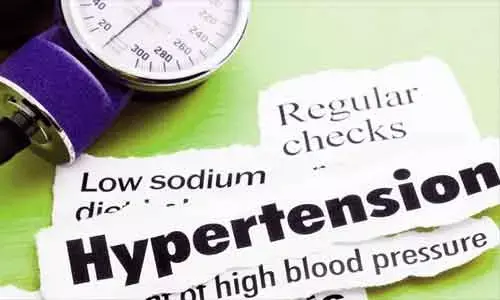- Home
- Medical news & Guidelines
- Anesthesiology
- Cardiology and CTVS
- Critical Care
- Dentistry
- Dermatology
- Diabetes and Endocrinology
- ENT
- Gastroenterology
- Medicine
- Nephrology
- Neurology
- Obstretics-Gynaecology
- Oncology
- Ophthalmology
- Orthopaedics
- Pediatrics-Neonatology
- Psychiatry
- Pulmonology
- Radiology
- Surgery
- Urology
- Laboratory Medicine
- Diet
- Nursing
- Paramedical
- Physiotherapy
- Health news
- Fact Check
- Bone Health Fact Check
- Brain Health Fact Check
- Cancer Related Fact Check
- Child Care Fact Check
- Dental and oral health fact check
- Diabetes and metabolic health fact check
- Diet and Nutrition Fact Check
- Eye and ENT Care Fact Check
- Fitness fact check
- Gut health fact check
- Heart health fact check
- Kidney health fact check
- Medical education fact check
- Men's health fact check
- Respiratory fact check
- Skin and hair care fact check
- Vaccine and Immunization fact check
- Women's health fact check
- AYUSH
- State News
- Andaman and Nicobar Islands
- Andhra Pradesh
- Arunachal Pradesh
- Assam
- Bihar
- Chandigarh
- Chattisgarh
- Dadra and Nagar Haveli
- Daman and Diu
- Delhi
- Goa
- Gujarat
- Haryana
- Himachal Pradesh
- Jammu & Kashmir
- Jharkhand
- Karnataka
- Kerala
- Ladakh
- Lakshadweep
- Madhya Pradesh
- Maharashtra
- Manipur
- Meghalaya
- Mizoram
- Nagaland
- Odisha
- Puducherry
- Punjab
- Rajasthan
- Sikkim
- Tamil Nadu
- Telangana
- Tripura
- Uttar Pradesh
- Uttrakhand
- West Bengal
- Medical Education
- Industry
ACEIs and ARBs may improve prognosis of high BP patients with COVID-19, finds review

Rochester, MN, - Researchers after reviewing studies have concluded that ACEIs and ARBs, may have a role to play in the treatment of COVID-19 and may rather improve outcomes in hypertensive patients with underlying Covid 19 infection.
An active debate has been on with respect to the potential influence of angiotensin-converting enzyme inhibitors (ACEIs) and angiotensin receptor blockers (ARBs) in patients during the COVID-19 outbreak. One of the ways the virus enters the body is through ACE2, the enzyme that converts angiotensin I to angiotensin II in the lungs and other tissues and organs, suggesting to some that the drugs may increase susceptibility to the virus and severity of the disease. Therefore it was hypothesized that patients with underlying health conditions such as hypertension, heart failure, and chronic kidney disease are at increased risk of severe coronavirus disease 2019 (COVID-19).
Dr. Sanchis-Gomar and his coauthors after reviewing more than 60 published studies have concluded that, importantly, no studies have reported an increase in circulating ACE2 levels or expression thus far, and increased expression would not necessarily imply an increased risk of infection or disease severity. Their research included studies that suggest that elevated levels of angiotensin II, the target of renin-angiotensin-aldosterone system (RAAS) inhibitors such as ACEIs and ARBs, may foster acute respiratory distress syndrome (ARDS) in COVID-19 patients. Other research suggests that RAAS inhibitors may have a role to play in the treatment of COVID-19. The authors note, however, that much more research and evidence are needed.
The new review has been published in Mayo Clinic Proceedings.
A group of scientists who have been working on the frontlines fighting the deadly virus in Spain, Italy, and the United States, dissect the controversy in considerable detail, to explain the level of evidence on this topic for clinicians. "In agreement with current guidelines, we recommend patients with hypertension should continue taking anti-hypertensive medications without interruption," says lead author Fabian Sanchis-Gomar, MD, PhD, of the Department of Physiology, Faculty of Medicine, University of Valencia and INCLIVA Biomedical Research Institute, Valencia, Spain; and Division of Cardiovascular Medicine, Stanford University School of Medicine, Stanford, CA, USA.
In a video accompanying the article, co-author Carl J. Lavie, MD, of the John Ochsner Heart and Vascular Institute, Ochsner Clinical School-University of Queensland School of Medicine, New Orleans, LA, USA, says, "Angiotensin II is known to foster inflammation, oxygenation, vasoconstriction, and fibrosis, so it is quite conceivable that a pharmaceutical agent that can inhibit the production of this hormone could actually be very beneficial for preventing lung injury and also for systemic health. Certainly, it is premature right now to start these agents as a preventive measure for COVID-19 in patients with no other indicator for RAAS inhibitors. However, this is an active area for investigation."
Current evidence indicates that RAAS inhibitors significantly reduce mortality in cardiovascular disease, reduce the progression of chronic kidney disease, and are the cornerstone of treatment for heart failure and hypertension. "ACEIs or ARB's therapy should be maintained or initiated, as indicated, in patients regardless of COVID-19," notes Dr. Sanchis-Gomar.
While no differences exist between ARBs and ACEIs in terms of efficacy to decrease blood pressure and improve other outcomes, a cough sometimes associated with the use of ACEIs, and withdrawal rates due to adverse events are lower with ARBs. "Given the equal efficacy but fewer adverse events, ARBs could potentially be a more favorable treatment option in COVID-19 patients at higher risk for developing severe forms of the disease," says Dr. Sanchis-Gomar.
For further reference log on to:
Dr Kamal Kant Kohli-MBBS, DTCD- a chest specialist with more than 30 years of practice and a flair for writing clinical articles, Dr Kamal Kant Kohli joined Medical Dialogues as a Chief Editor of Medical News. Besides writing articles, as an editor, he proofreads and verifies all the medical content published on Medical Dialogues including those coming from journals, studies,medical conferences,guidelines etc. Email: drkohli@medicaldialogues.in. Contact no. 011-43720751


